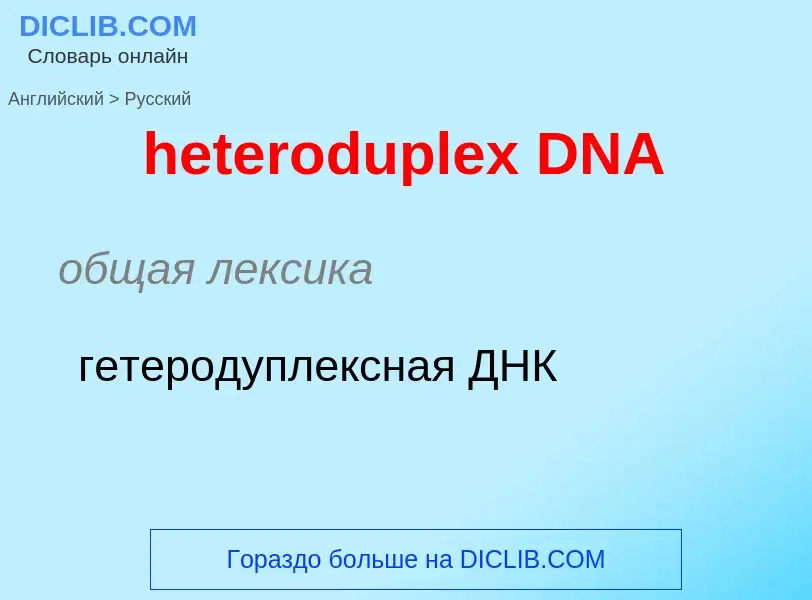Μετάφραση και ανάλυση λέξεων από τεχνητή νοημοσύνη
Σε αυτήν τη σελίδα μπορείτε να λάβετε μια λεπτομερή ανάλυση μιας λέξης ή μιας φράσης, η οποία δημιουργήθηκε χρησιμοποιώντας το ChatGPT, την καλύτερη τεχνολογία τεχνητής νοημοσύνης μέχρι σήμερα:
- πώς χρησιμοποιείται η λέξη
- συχνότητα χρήσης
- χρησιμοποιείται πιο συχνά στον προφορικό ή γραπτό λόγο
- επιλογές μετάφρασης λέξεων
- παραδείγματα χρήσης (πολλές φράσεις με μετάφραση)
- ετυμολογία
heteroduplex DNA - translation to ρωσικά
общая лексика
гетеродуплексная ДНК
общая лексика
гетеродуплекс
общая лексика
ДНК
дезоксирибонуклеиновая кислота
(Distributed Internet Application) распределённые приложения Интернет, архитектура DNA
(Digital Network Architecture) архитектура цифровой сети
сетевая архитектура, разработанная корпорацией Digital Equipment. Реализована в сети DECnet
синоним
Смотрите также
существительное
общая лексика
архитектура цифровых сетей
синоним
Βικιπαίδεια
A heteroduplex is a double-stranded (duplex) molecule of nucleic acid originated through the genetic recombination of single complementary strands derived from different sources, such as from different homologous chromosomes or even from different organisms.
One such example is the heteroduplex DNA strand formed in hybridization processes, usually for biochemistry-based phylogenetic analyses. Another is the heteroduplexes formed when non-natural analogs of nucleic acids are used to bind with nucleic acids; these heteroduplexes result from performing antisense techniques using single-stranded peptide nucleic acid, 2'-O-methyl phosphorothioate or Morpholino oligos to bind with RNA.
In meiosis, the process of crossing-over occurs between non-sister chromatids, which results in new allelic combinations in the gametes. In crossing-over, a Spo11 enzyme makes staggered nicks in a pair of sister chromatid strands (in a tetrad organization of prophase). Subsequent enzymes trim back the 5' ends of the strand and a protein complex binds to the 3' single-stranded ends. Rad51 protein is recruited and binds in a protein complex to search for a complementary sequence analogous to double-strand-break repair. The filament searches for the homologous chromosome, strand invasion occurs where the new chromosome forms a D-loop over the bottom sister chromatid, then the ends are annealed. This process can yield double Holliday junctions that when cut in a transversal pattern by endonucleases form 2 heteroduplex strand products.
Heteroduplex DNA is also a source of small RNAs (smRNAs), causing post-transcriptional gene silencing.



![DNA major and minor grooves. The latter is a binding site for the [[Hoechst stain]] dye 33258. DNA major and minor grooves. The latter is a binding site for the [[Hoechst stain]] dye 33258.](https://commons.wikimedia.org/wiki/Special:FilePath/DNA-ligand-by-Abalone.png?width=200)
![animated version]]). animated version]]).](https://commons.wikimedia.org/wiki/Special:FilePath/DNA animation.gif?width=200)

![B]] and [[Z-DNA]] B]] and [[Z-DNA]]](https://commons.wikimedia.org/wiki/Special:FilePath/Dnaconformations.png?width=200)

.jpg?width=200)




![[[Maclyn McCarty]] (left) shakes hands with [[Francis Crick]] and [[James Watson]], co-originators of the double-helix model based on the X-ray diffraction data and insights of Rosalind Franklin and Raymond Gosling. [[Maclyn McCarty]] (left) shakes hands with [[Francis Crick]] and [[James Watson]], co-originators of the double-helix model based on the X-ray diffraction data and insights of Rosalind Franklin and Raymond Gosling.](https://commons.wikimedia.org/wiki/Special:FilePath/Maclyn McCarty with Francis Crick and James D Watson - 10.1371 journal.pbio.0030341.g001-O.jpg?width=200)
![Interaction of DNA (in orange) with [[histone]]s (in blue). These proteins' basic amino acids bind to the acidic phosphate groups on DNA. Interaction of DNA (in orange) with [[histone]]s (in blue). These proteins' basic amino acids bind to the acidic phosphate groups on DNA.](https://commons.wikimedia.org/wiki/Special:FilePath/Nucleosome1.png?width=200)




![The Eagle]] [[pub]] commemorating Crick and Watson The Eagle]] [[pub]] commemorating Crick and Watson](https://commons.wikimedia.org/wiki/Special:FilePath/TheEaglePub-Cambridge-BluePlaque.jpg?width=200)
